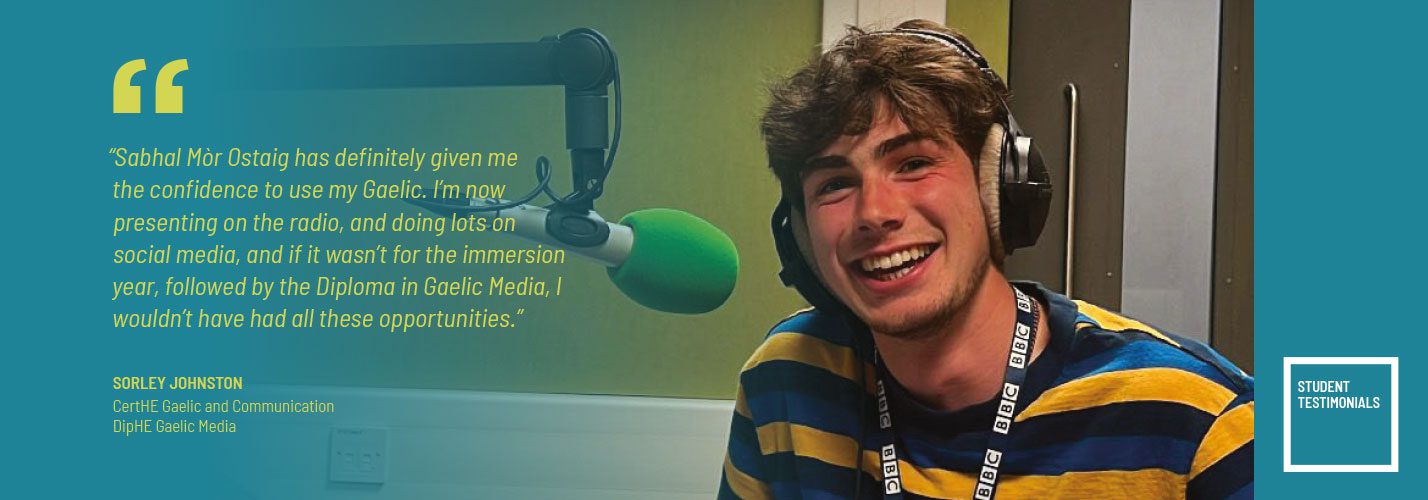CertHE Gaelic and Communication
AWARD: Certificate of Higher EducationSTUDY MODE: Full-time,On-campus
DURATION: 1 YEAR
CODE: QP59
COURSE LEADER: Dr Timothy Currie Armstrong
COURSE CONTACT: Eilidh Grant ( )
DESCRIPTION
CertHE Gaelic and Communication is a year-long intensive immersion course aimed at students who are reasonably fluent and who want to rapidly improve their Gaelic. Depending on their level of Gaelic, all of our BA (Hons) degree students will complete either Gaelic and Communication or An Cùrsa Comais in their first year. Students may also take CertHE Gaelic and Communication as a one-year, standalone immersion course. On this course, students will take advantage of our unique Gaelic-immersion community at Sabhal Mòr Ostaig to make rapid progress in their Gaelic speaking, listening, reading and writing skills. Students are expected to come prepared to use Gaelic at all times and in all situations on-campus at the College.
SAAS will waive previous study rules on Cert HE Gaelic Immersion courses at UHI (specifically Sabhal Mor Ostaig college in Skye). Students who have received funding for a degree or HN level qualification already are still eligible to receive funding for this course.
If the Cert HE Gaelic Immersion is studied prior to another programme of study (e.g. an HNC or degree), it won’t be taken into account for previous study.
COURSE CONTENT
This is a course for proficient Gaelic speakers who wish to study Gaelic to an expert level in a fully Gaelic-speaking environment. This intensive, immersion course prepares students for university-level Gaelic-medium education and for progression to the second year of Sabhal Mòr Ostaig’s Gaelic-medium BA and BA (Hons) degrees. Students will study Gaelic literature, Gaelic development, creative writing (short story and song), and public speaking, as well as gain a thorough understanding of the Gaelic language itself, including pronunciation, grammar, vocabulary, idiom and formal registers. By the end of CertHE Gaelic and Communication, students will be able to speak, understand, read and write Gaelic with complete confidence, allowing them to fully take part in all aspects of modern Gaelic life in Scotland.
Main course features
- Study Gaelic to an expert level in a lively immersion environment;
- Read and discuss seven modern Gaelic novels;
- Write short stories, songs and expositions in Gaelic;
- Read scholarly articles in Gaelic;
- Design and implement two Gaelic development projects on campus;
- Participate in a three-week work experience placement in Gaelic.
CORE MODULES
Module Code: UQ507230
Credits: 20
The purpose of this module is to provide a snapshot of why Gaelic is in its current state. To understand this, the module is in two halves. The first half looks at the growth and decline of the Gaelic language throughout history. In the second half, we look at the sociopolitical motivations behind the revival of the Gaelic language, especially from the 1970s onwards.
On completion of the module, the student should be able to:
- Demonstrate an understanding of the cultural, historical, geographical and linguistic factors that have shaped the Highlands;
- Demonstrate an awareness of the political, social, cultural and economic issues affecting the Highlands today;
- Demonstrate an understanding of the implications of creating and maintaining an identity in the Highlands;
- Apply the knowledge and understanding of the module to a project on a community or topic related to the Highlands, showing the sources correctly.
Module Code: UQ507232
Credits: 20
In this module, you will become familiar with different types of Gaelic literature – short stories, drama and poetry. By reading this material, you will enhance your knowledge of the Gaelic language, both in words and idioms, in an enjoyable way. You will also learn about literature review and related technical terms.
On completion of the module students should be able to:
- apply appropriate literary criticism procedures;
- read closely a wide range of Gaelic literature;
- express opinions based on judgment and assertion;
- use appropriate Gaelic terminology for module applications;
- write in Gaelic at an appropriate level.
Module Code: UQ507229
Credits: 20
This module aims to enable students to use Gaelic confidently and effectively in a work setting.
The student will spend three weeks on a work placement and at the end of the placement they will have to write a diary and an evaluation report, outlining what they have learned and how they have achieved their goals.
Upon completion of the module, the student should be able to
- Demonstrate the skills required for effective personal development, in terms of language and work skills;
- Demonstrate the ability to plan and participate in a work placement;
- Demonstrate the ability to undertake and complete a work placement;
- Evaluate their work placement on completion.
Module Code: UQ507242
Credits: 20
This module is designed for students who have been educated through the medium of Gaelic in primary and secondary school, or for other students who are reasonably fluent in Gaelic, and who wish to study Gaelic to an expert level.
In this module, you will cover the entire structure of Gaelic, from pronunciation and prosody, to grammar, vocabulary, idioms, discourse styles, and formal and informal registers.
Over the course of this module:
- You will gain confidence in your ability to speak Gaelic as a daily social language with other Gaels;
- You will develop your higher register spoken and written Gaelic so that you can successfully communicate in formal settings, e.g. in work or in academia;
- You will improve your reading skills so that you can comfortably enjoy reading Gaelic literature of all kinds, classic and modern;
- You will acquire university level academic skills in research, sourcing, project management, and scholarly writing;
- You will have fun learning Gaelic, but you will also be challenged academically; preparing yourself to pursue a successful career in the Gaelic world in the future.
Module Code: UQ507241
Credits: 20
What does it mean to be a Gael in the 21st century? How is Gaelic used today, in the Highlands and the Lowlands, in rural or urban areas? What does it mean to be an activist in the Gaelic revival? What will be required to re-strengthen Gaelic as a spoken language in the 21st century?
In this module, we will be working on our high register spoken and written Gaelic, but at the same time, we will be studying contemporary Gaelic culture, with a particular focus on the Gaelic novel as unique site of inquiry into modern Gaelic identity.
Over the course of this module:
- You will gain confidence in your ability to speak Gaelic as a daily social language with other Gaels;
- You will develop your higher register spoken and written Gaelic so that you can successfully communicate in formal settings, e.g. in work or in academia;
- You will improve your reading skills so that you can comfortably enjoy reading Gaelic literature of all kinds, classic and modern;
- You will take an active part in Gaelic culture, exploring your own creativity in the language;
- You will gain an understanding of the Gaelic revival and your own role in it as an activist, strengthening Gaelic as a spoke language at the College, in your daily life, and throughout Scotland;
- You will acquire university level academic skills in research, sourcing, project management, and scholarly writing;
- You will have fun learning Gaelic, but you will also be challenged academically; preparing yourself to pursue a successful career in the Gaelic world in the future.
OPTIONAL MODULES
Module Code: UW307227
Credits: 20
Students work in bands to create pieces of music (to be sung and performed). These pieces will be performed in public, in a concert setting, and in a rehearsal.
In addition, students learn musical vocabulary.
Each student will receive individual tuition in their chosen specialist subject. Approximately 91 hours will be spent working on the student’s specialist subject, with approximately 24 hours of one-to-one teaching and 65 hours of group teaching. Singing is taught, as a group, for 24 hours throughout the year.
On successful completion of the module the student should have:
- acquisition of performance skills on chosen area of specialisation appropriate to this level;
- acquisition of basic ensemble skills in chosen area of specialisation and group vocal music;
- an understanding of essential vocabulary.
Module Code: UW307228
Credits: 20
In this module, students will learn about the rhythm, structure and balance of Gaelic music. They will also gain a good understanding of Gaelic music theory, chords and terminology. There are also sessions on sound production in the studio. This module is delivered once a week over semesters 1 and 2.
On successful completion of the module the student will have:
- an understanding of fundamental music theory and related Gaelic vocabulary;
- acquisition of basic composition and arrangement skills;
- the ability to use Sibelius software to produce neat and musically accurate scores.
Module Code: UQ507234
Credits: 20
The aim of this module is to enable students to become familiar with a wide range of stories and songs in the Gaelic tradition, and to highlight the role of both in Gaelic scholarship.
The module also aims to increase students’ vocabulary and develop their understanding of dialects and idioms.
On completion of the module, students should be able to:
- Demonstrate the acquisition and application of transcription skills.
- Demonstrate an awareness of the wide range of Gaelic song by traditional and modern artists and critically evaluate its importance to the Gaelic language and culture.
- Research and produce a version of a traditional tale.
Entry Requirements
Qualifications
- 3 SQA Higher passes at grades BBC or above, including Gàidhlig (fluent speakers) or Gaelic (learners) at B or above; or
- other equivalent qualifications subject to the discretion of the Course/Programme Leader.
You will be required to satisfy the College of your ability in Gaelic. All prospective music degree students must also undertake a music audition. Students without an SQA pass in Gaelic must satisfy the college of their ability in Gaelic. For applicants with little or no previous knowledge of Gaelic, Sabhal Mòr Ostaig offers An Cùrsa Inntrigidh, a distance learning course which aims to prepare students for entry to year one of the degree programme.
Additional Requirements
The Workplace Experience module is a core module on this course and registration with Disclosure Scotland’s PVG Scheme will be required should you choose to undertake your placement at a school or other childcare establishment.

Fees and Funding
For course costs, please visit our Fees page.
How to Apply
All prospective students must apply through the Universities and Colleges Admissions Service (UCAS). This is the central admissions service for all universities and colleges of higher education in the UK.
Contact details:
Registry & Admissions Office
Sabhal Mòr Ostaig
Sleat
Isle of Skye
IV44 8RQ
Useful information for applying through UCAS:
Institution Name: HIP
Code: H49
Campus: K
After the Course
You will have developed skills which will enhance your employment prospects in the following areas:
- Gaelic development and community development
- Gaelic media sector
- Gaelic/Gaelic-medium teaching
COURSE FEE 2025/26
* In most cases, Scottish domiciled fee status students have their fees paid for them by the Student Awards Agency for Scotland (SAAS) and may be eligible for living cost support.
Full-time students, fee per year (120 credits)

